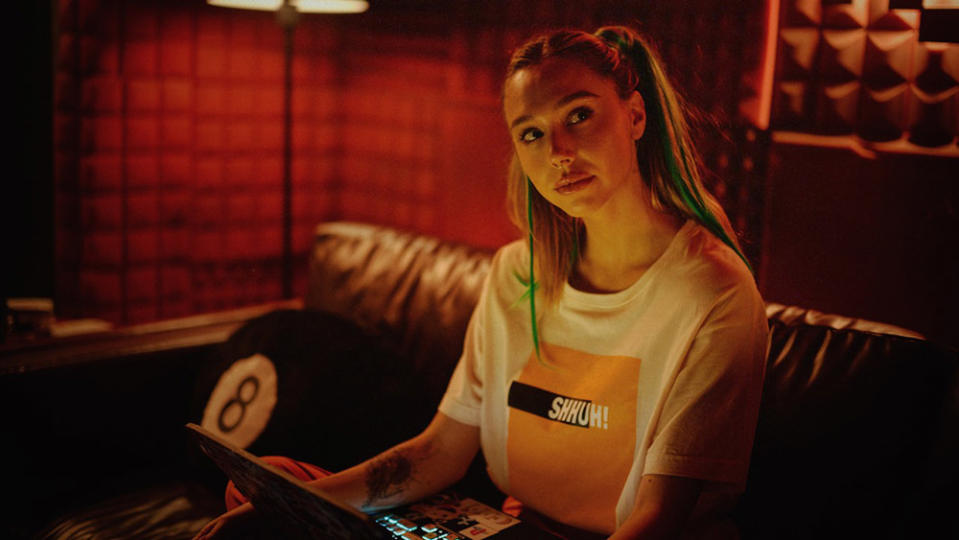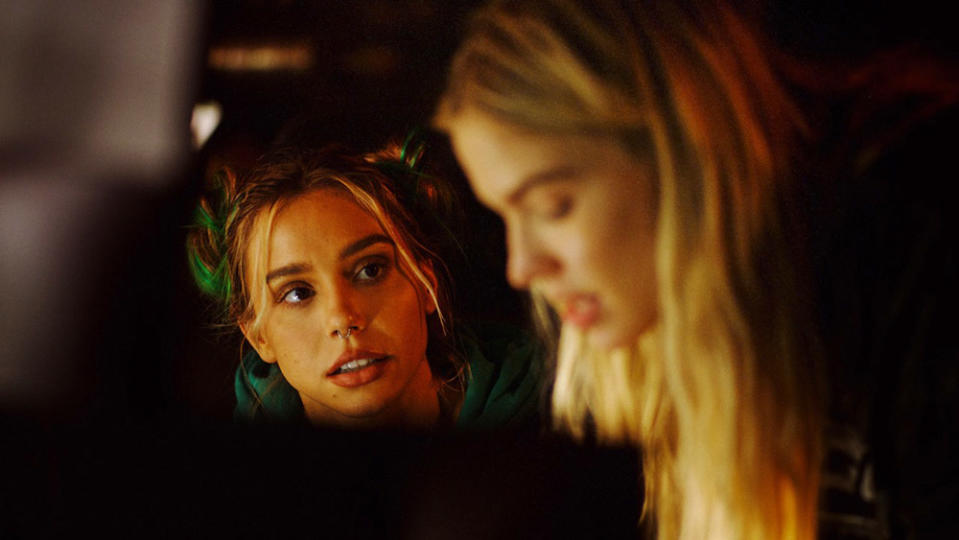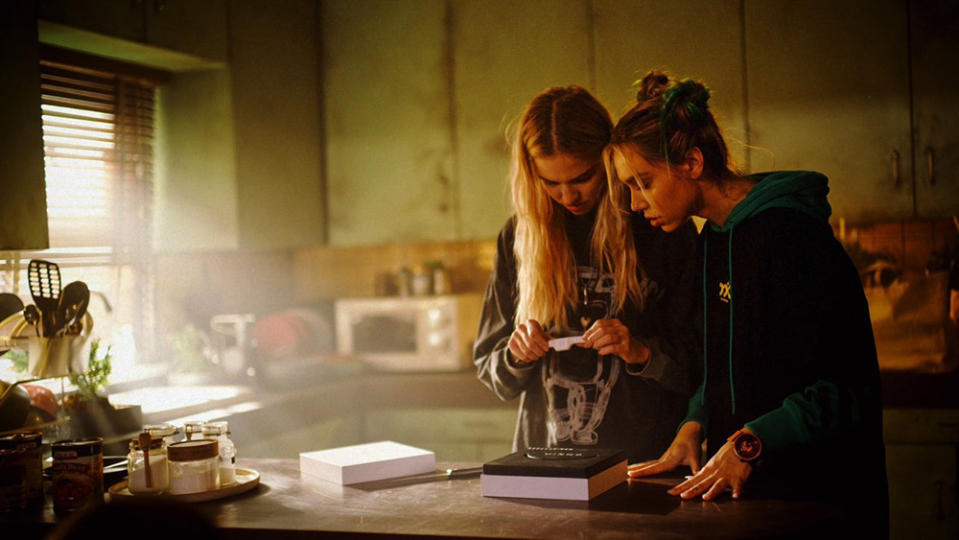Alexis Ren Asks for an Open Mind as She Takes On Her Biggest Movie Role with ‘Latency’

Latency star Alexis Ren knows full well the perception that comes with a social media star making the jump to acting. It provokes the same skeptics that countless athletes, musicians and professional wrestlers had to endure when they first embarked on their own film and television careers in decades past. But, by keeping an open mind, we now have a long list of crossover performers that we’ll forever embrace on the big and small screen. In Ren’s case, she has the utmost respect for the craft of acting, so she started educating herself back in 2018, all in an effort to earn the same kind of acceptance that Mark Wahlberg, Lady Gaga and Dave Bautista once sought and received from the audience.
However, the news didn’t go over well at first with Ren’s sprawling social media following of 25-plus million people.
More from The Hollywood Reporter
“When I said, ‘Hey, I’m going to try acting,’ there was not a particularly positive response. They were like, ‘We know you as a model, stay as a model, so that I feel comfortable by putting you in a box in my head and keeping you there,’” Ren tells The Hollywood Reporter. “But I just ask for the grace of change, because that’s what we’re all truly asking for right now. It’s just the ability to change without judgment, without needing to be held to the past version of ourselves.”
Growing up in Santa Monica, Ren initially resisted the nearby industry and decided to zag, finding early success as a teenager on social media, specifically the 2012-era of microblog Tumblr. That eventually carried over into Instagram, YouTube and other major platforms. Social media then created various modeling and entrepreneurial opportunities for Ren, as well as the chance to compete on the 27th season of Dancing with the Stars in 2018.
But, in hindsight, it was the 2014 death of her mother that put her on the trajectory toward reconsidering the idea of becoming an actor. It laid the groundwork for her interest in psychology and how traumatic events in life reshape us, and she soon realized that she could apply that side of herself to characters.
“Understanding why we are the way we are — our subconscious, our consciousness, our trauma — all of that is really fascinating to me. And all of that comes into play with acting,” Ren shares.
Ren’s profound loss at age 17 is also why she’s since devoted a great deal of time and energy to mental health activism, namely through her wellness community, We Are Warriors, which she co-founded In 2021. It’s equally the reason why James Croke’s Latency spoke to her. The psychological horror-thriller chronicles an agoraphobic gamer (Sasha Luss’ Hana) and her neighbor/best friend/caretaker, Jen (Ren), during the former’s test of a new console that syncs up with the gamer’s neurological activity. Its themes also tie into the real-life conversation around how much society should surrender itself to budding technologies such as AI and brain–computer interfaces.
“[Mental health] was the reason I was drawn to Latency. I didn’t think I would necessarily do a scary film because a lot of scary films are just there to scare you. They don’t always have a deeper meaning,” Ren says. “So I understood why [writer-director] James [Croke] wanted to create this … It’s what’s going on in the world today. It’s that conversation of, ‘Are we going to control technology, or is it going to control us?’ So I just thought it was perfect in that way.”
Below, during a recent conversation with THR, Ren also speculates as to why Gen Z does a lot of plate spinning but very little moviegoing.
So I first want to give THR readers a sense of your backstory and how you got here. Did your social media endeavors really all start on Tumblr?
Can you believe it? Yeah, they did. I was so young, and a lot of girls my age can relate to this, but we were just DIY-ing it by doing our own photoshoots and making our own music videos. It was a very pure time on the internet, and then through that, I just started to gain friends and people who I didn’t know. So it just started to grow and grow, and it was very pure back then. I’m not saying it’s not pure now, but it was sweet then.

And what prompted you to pursue acting these last few years?
If you would’ve asked 18-year-old Alexis, “Hey, do you want to act?” I would’ve been like, “No.” I’m from Santa Monica, so it was just in my face all the time, and I wanted to be original by not wanting to act. (Laughs.) But, at the time, I didn’t actually look at if it aligned with who I am as a person. I love psychology. I love understanding why people are the way they are. I love living tons of different lives, and I love being on a set. It’s always felt like a home to me. So, around 2018, I finally sat down in acting class and just said, “Okay, let’s just see if I like this thing. Let’s see if this is something I could do.” I’m the type of person where if I do something, I do it a hundred percent. And so I knew that if I was going to commit to it, I had to actually commit to it.
I ended up studying for three years, and I fell in love with it. I realized it’s been a part of my life for as long as I can remember by understanding human identity and having compassion and empathy and psychoanalyzing people. It’s been something I’ve naturally done my entire life. So it finally felt like the time to do it, and I’m grateful that I started in my adult life, as opposed to being a child and growing up into it. That can get a little confusing.
Your generation is definitely known for wearing lots of hats and doing many different things. Do you have any theories as to why that is?
Back in the day, if you went to college, you were guaranteed a job, and from that, you were guaranteed money. Now, everything feels less stable than it used to be. So we’re honestly trying to compensate for that, and then we also have this urge for purpose. That’s a privilege that my generation has, and so we’re on this adventure to see what our purpose is and how we can give back to the world. So that’s something that’s creating these different paths for us. But, for me, personally, it’s art. So whatever that looks like, however it manifests, it’s always going to be the same intention to share my human experience with the world, whether that’s through dancing or writing or acting. That’s just who I am as a person, and that might show up in many different ways, but the intention is always the same. And I’m seeing that with a lot of people my age who are trying on different hats.
But we, in general, don’t like that. We like it when people stay in boxes. It makes us feel safe, and I felt that with my following. When I said, “Hey, I’m going to try acting,” there was not a particularly positive response. They were like, “We know you as a model, stay as a model, so that I feel comfortable by putting you in a box in my head and keeping you there.” I also do that to other people all the time, so I understand it from a psychological perspective, but I just ask for the grace of change, because that’s what we’re all truly asking for right now. It’s just the ability to change without judgment, without needing to be held to the past version of ourselves. We’re asking for that in relationships. We’re asking for that in life and friendship, and the world in itself is asking for the grace of change. So it might be a micro of the macro expression right now.
It’s tough to get Gen Z into movie theaters unless there’s a cultural and social component like we saw last summer with Barbie and Oppenheimer. Why do you think moviegoing is not the biggest priority to younger generations?
Because there’s so much out in the world right now, we’re feeling really disconnected from rooted culture. At least that’s what I feel about being in America. We have that orphan archetype where we’re just like, “Where do I belong? What is my past and my history?” And that’s why movies and films are so important because they tell the story of humanity. So there might be a lack of that right now just because there’s so much noise with the new streaming platforms, but we are going to wrap back around and have that reconnection once we understand what [younger] generations want and what stories we want to be told. So it is becoming more of a fast food restaurant, as opposed to a nice dine-in experience, but we’ll probably go back to that.

We’ve arrived at Latency, which is a psychological horror-thriller about an agoraphobic gamer named Hana and her neighbor, Jen (Ren), who looks after her. Did you and Sasha have to read together since the movie is basically just the two of you?
Yeah, I was obviously nervous. I loved Sasha in Anna. She’s an incredible actress, so I was definitely hoping to just meet her where she is as far as talent. I also wanted to create an authentic relationship. I’m the type of person where if I go onto set and we’re supposed to be best friends, we’re going to be best friends. That’s how I love to do it, but it doesn’t always work, and I was so lucky to have that experience with her. There was just a very easy integration into our actual roles, and naturally, I’m very similar to Jen. I have a very sarcastic and kind of dry sense of humor. So it was the first time where I was like, “I know this girl, I understand this girl. Let me put some sauce and sprinkles on her as well.” So that was fun, and Jen is the ultimate friend. She really loves Sasha’s character, Hana. She wants to be there for Hana. She’s so soft and loving with her, and yet, goofy and funny at the same time. And that is hard to do within a friendship where there’s an illness. Hana has agoraphobia, so there is this sensitivity that Jen has to have with her.
Did you come up with a backstory for how Jen became Hana’s friend and caretaker?
Well, in my head, I made up a story from about five years earlier where a package was wrongly sent to Jen, and so she brought it downstairs. And Jen’s a gamer. She’s not incredible, but she’s a gamer.
“A Mario Kart kind of gal.”
Yeah, she loves the lifestyle and the vibe and the aesthetics of gaming, but she’s not intensely into gaming. So, when she saw Hana’s gaming setup, she ran inside and was like, “What do you do?” And once she found out that there was agoraphobia in Hana’s life, she felt a sense of purpose. Jen was looking for a purpose before she met Hana, so Hana became her purpose and that’s how the friendship began. There’s a lot of deeper layers than just the friendship, but Jen is Hana’s lifeline and Hana is Jen’s purpose.
Jen lightens things up in an otherwise psychologically heavy movie, and since you mentioned the similarities between the two of you, do you try to take on that role in real life? Will you defuse a tense situation?
Yes, I am definitely the type of person who will crack a joke in a very not funny situation. Jen is funny and dry and tries to keep it light, but, because of how much despair Hanah lives in, she feels like she has to mirror the opposite of that. So I am a similar friend to Jen in that sense. I’ll go above and beyond, but I’ll still bully you a little bit verbally, which is how I show my love. So I really felt a sense of connection to Jen.

Hana can’t help the fact that her condition won’t let her leave her apartment, but her tech only intensifies it. Would you say that one of the themes of this movie is to not let our devices hold us captive?
Yeah, and it’s just having that moment where we start asking those deeper questions of, why are we bringing this technology into our lives? Is it for convenience, or is it because it’s aligned with our values? And it’s also just making sure that you use it, as opposed to it using you. This movie brings up so many conversations that I’ve had with some of my past friends, and it’s exactly what’s happening in the world today. So that’s why I specifically loved this movie. We can finally start to talk about these things. Neuralink is in someone right now and it works. So we have to be very aware of the stuff inside of us — our subconscious, what we’re going through — because that will reflect into technology if we’re not careful. We see that on the level of social media. We see everyone’s pain. We see people projecting all day long. We see online bullies. It’s a real thing, and I’ve had my fair share of it. So imagine what that would be like when we can’t differentiate the virtual world from reality. We really have to be careful right now.
Now that you’ve worked on a number of movie sets, what’s the one thing you least expected about this kind of work?
I understood sets just by being a model in commercials and all of those types of things, but, specifically for acting, there was a moment on a different set where we were just rushed. We had so many scenes to do that we didn’t really have time to prepare for this really intense scene, and I kind of just went straight into this really heartbreaking scene. My girlfriend, in the scene, was overdosing, and it was just really intense. So I thought that I had to do all this work beforehand, but because I was just there and present, I had this crazy cathartic experience. I actually experienced the entire thing in real life, and it was the first time I understood acting. I was like, “Oh, you have to get out of the way so that the story can be told through you.” So that’s when I was like, “I love acting,” because it felt so good to cry for all the people who had to save their friend who’s going through an overdose. I felt like I was with those people and their stories in that moment, and it was actually such a spiritual experience as well. So, through that, I was like, “I understand why people love this.” Also, we strive for things that make us forget time. If it’s a conversation, if it’s dance, if it’s acting, if it’s a scene, whatever it is, we strive for those moments where we finally let ourselves go and we forget about ourselves and we forget about time. It’s called flow state, but that’s what we’re all looking for, and acting does that for me.
What are your acting ambitions going forward? Is a ballet-related movie the ultimate dream?
There actually is a role that I’m … I won’t say because I don’t want to jinx it, but I’m learning how to surf for it, so that when I audition, I can say, “Hey, I’ve learned how to surf.” My body has always been the thing that I’ve used my entire life. I’ve been a ballerina for 20 years, and obviously, acting is physical as well, so it’s what I know how to do. So, through that, I like to pinpoint different roles that I would love, and then I prepare for them before they even come around. It’s fun, and it’s an excuse to be something new. I love physicality, and I’ve even learned combat and how to use a gun. So all of those things are helpful, and I definitely want to do something along those lines.
You also do a lot of activism involving mental health. What first pointed you in this direction?
It was my mom. She passed away when I was 17.
I’m so sorry.
Thank you. It was very hard, because I was still a teenager and I didn’t really know what’s going on with the world. But she was a guru in that sense. She really was my friends’ therapist. Literally, my friends would come over not to see me, but to see my mom. So I watched her be this mother for everyone, and the energy that she exuded was so special. She was also a health nutritionist, so she really cared about her health, and that just transcended into everything that I put into my wellness community, We Are Warriors. Once she died, I was like, “Oh, I don’t want to think about anything involving her.” So I didn’t really want to get into mental health and wellness because it reminded me so much of her, but then I realized that she set me on this grand journey and this grand path. I didn’t intentionally create the wellness community; it just created itself in a way.
And through that, I’ve just been asking how I can be of service to it, because when something is meant to evolve and meant to be there, you are a parent to it. You help it grow and do what it needs, but it’s been incredible. I’ve been working with girls for about four years now, and I know these girls like little sisters. So it’s just really cool to be there for someone who was 17 and now 21, and watching them go through that and helping them and being that big sister energy. I co-founded [WAW] with my godsister [Allie Michelle] who was there for me through that whole time, and we’ve been on this journey our entire lives. This is why acting felt so aligned, because understanding why we are the way we are — our subconscious, our consciousness, our trauma — all of that is really fascinating to me. And all of that comes into play with acting.
In hindsight, is the mental health side of Latency one of the reasons why you were drawn to it?
It was the reason I was drawn to Latency. I didn’t think I would necessarily do a scary film because a lot of scary films are just there to scare you. They don’t always have a deeper meaning. And, for me, a movie is at its highest form when it’s having a conversation that’s relevant today or was relevant or is relevant to certain individuals, and it speaks that story. So I understood why [director] James [Croke] wanted to create this and do this because it’s relevant. It’s what’s going on in the world today. It’s that conversation of, “Are we going to control technology, or is it going to control us?” So I just thought it was perfect in that way.
Lastly, I have 15,000 followers on social media, which is nothing. That’s like five minutes on a Tuesday for you.
(Laughs.)
But it’s enough people to make me paranoid about everything I post. I scrutinize every comma and examine any possible way something could be misconstrued. You, on the other hand, have a total following [25-plus million] that is greater than the individual populations of 178 countries. I actually looked that up.
Oh God, don’t tell me that! (Laughs.)
Do you also feel a ton of anxiety before you post anything? Does that happen?
It does, but it’s also given me a gift because I’m able to observe different things from different perspectives. I’m now thinking about it from a worldly perspective: “When I say this, this will be misconstrued in this many ways.” I think of it in that way, and it’s almost like understanding how to speak to PR and interviews and learning that kind of lingo. I know what’s going to piss people off. I recently posted me doing open mic poetry, and I was like, “This is not why people follow me. I understand.” But I also knew that, for the people who would understand it, that it would hit them on a very deep level. So, what I’m doing now is just going, “Okay, who is this for? Okay, then that’s all I’m doing it for.” If I look at how to please everyone, I can’t. I literally can’t. But if some beautiful artists follow me and they hear that poem and are like, “Wow, that hit me, and thank you so much for saying that,” then that’s who I’m speaking to. So I just keep moving in that way, as some posts will be for other people and some posts will be for other people.
But social media is a very fragmented version of self. So I try not to put too much pressure on it, and I look for other outlets. I look at acting as a different outlet, as a place where I can be human. I look at slow-form content like podcasts or interviews as a better way to show a fuller sense of myself and to stop putting the weight on social media. But it helps a lot when I look at it as, “Okay, today I’m going to post for this group of people, and tomorrow, I’m going to post for this group of people.” It helps the brain compartmentalize it.
***
Latency is now playing in select theaters via Lionsgate.
Best of The Hollywood Reporter

 Yahoo News
Yahoo News 
